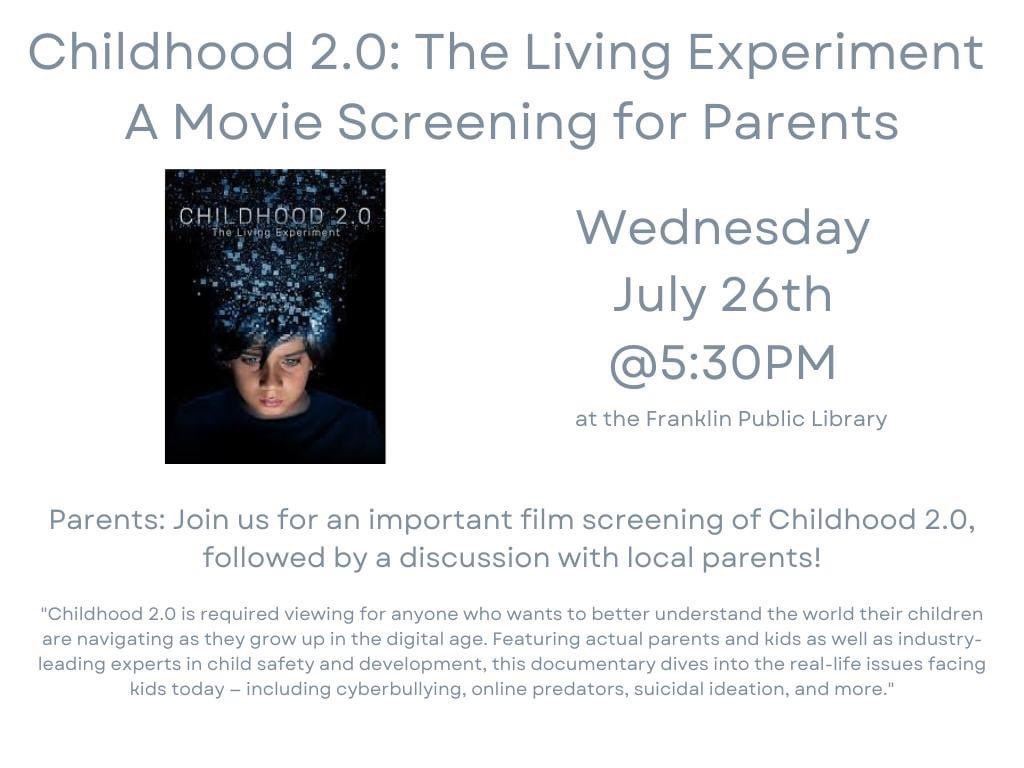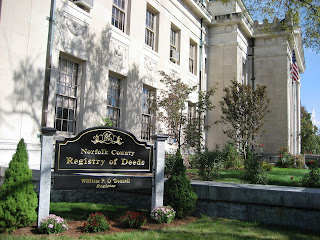| Video link -> https://www.youtube.com/watch?v=aj97-C4tMKc |
Providing accurate and timely information about what matters in Franklin, MA since 2007. * Working in collaboration with Franklin TV and Radio (wfpr.fm) since October 2019 *
Friday, August 8, 2025
Parents versus kids challenge: Who knows more about protecting personal information? (video)
Thursday, April 24, 2025
How to use parental controls to keep your kid safer online
 |
| How to use parental controls to keep your kid safer online |
Tuesday, April 1, 2025
Attention Parents: Check out the Interent Safety event April 3; it comes with free kid care & a meal
"Franklin Community,Most of you know me as the President of the Franklin Education Association. I'm also Chair of the Massachusetts PTA Health, Safety and Wellness Committee.THIS coming Thursday, April 3, from 5:30 -7pm at FHS, my committee is hosting a FREE Family Safety Awareness Forum about Online Safety and CyberBullying. Our doors open at 5:30 for child care, with the adult program running from 6-7pm. We have food for the kids and adults and activities for the kids. We're giving away an IPad as well.
Interent Safety event April 3 Please come learn how to identify online dangers and how to protect your kids and family."
Sunday, March 30, 2025
Attention Parents: Check out the Interent Safety event April 3; comes with free kid care & a meal (audio)
FM #1416 = This is the Franklin Matters radio show, number 1416 in the series.
This session shares my conversation with Donna Grady about the internet safety event coming up April 3. We recorded this talk in the Franklin TV Studios on Tuesday, March 25, 2025.
Most folks know of Donna as the Franklin Education Association (FEA) unit president and as a kindergarten at Keller, previously Jefferson, and teaching for over 35 years.
Donna has a new role as Chair of the MASS PTA Health & Wellness Committee. Wearing this hat, she heard of the grant opportunity to bring this program to Franklin and neighboring communities.
Parents with school age children are the target for this training/awareness. It is a free night with childcare and meals provided
The recording runs about 24 minutes. Audio link -> https://franklin-ma-matters.captivate.fm/episode/fm-1416-donna-grady-on-the-social-network-forum-apr-3-03-25-25/
--------------
Donna’s school contact info -> gradyd@franklinps.net
MASS PTA page -> https://www.massachusettspta.org/
MASS PTA Committees page -> https://www.massachusettspta.org/massachusetts-pta-committees/
Link to register for April 3 https://share.hsforms.com/2226Sv7n_QoyNDp00gcpumwgbr
Download a copy of the flyer as a reminder or to share ->
https://drive.google.com/file/d/1P7-y7T1nTm44l3WTh7SzD7ZWccJa4ce8/view?usp=drive_link
-------------
We are now producing this in collaboration with Franklin.TV and Franklin Public Radio (wfpr.fm) or 102.9 on the Franklin area radio dial.
This podcast is my public service effort for Franklin but we can't do it alone. We can always use your help.
How can you help?
If you can use the information that you find here, please tell your friends and neighbors
If you don't like something here, please let me know
And if you have interest in reporting on meetings or events, please reach out. We’ll share and show you what and how we do what we do
Through this feedback loop we can continue to make improvements. I thank you for listening.
For additional information, please visit Franklinmatters.org/ or www.franklin.news
If you have questions or comments you can reach me directly at shersteve @ gmail dot com
The music for the intro and exit was provided by Michael Clark and the group "East of Shirley". The piece is titled "Ernesto, manana" c. Michael Clark & Tintype Tunes, 2008 and used with their permission.
I hope you enjoy!
------------------
You can also subscribe and listen to Franklin Matters audio on iTunes or your favorite podcast app; search in "podcasts" for "Franklin Matters"
Tuesday, September 17, 2024
Attention Franklin Residents: Cybersecurity and 911 Services Outage Survey
Cybersecurity and 911 Services Outage Survey
This survey is to gauge the community's knowledge and readiness in the event of cybersecurity threat including 911 service outages and power outages. The research goal is to develop a cybersecurity threat community toolkit to better prepare the community in an emergency.
To fill out the survey, please click the link -> https://forms.gle/rPKcuWsYFzU3kHpNA
Shared from -> https://www.franklinma.gov/home/news/cybersecurity-and-911-services-outage-survey
Wednesday, September 11, 2024
Kayla Williams talks cybersecurity and her consulting services (audio)
FM #1276 = This is the Franklin Matters radio show, number 1276 in the series.
This session shares my conversation with Kayla Williams, Franklin resident and cyber security professional, who is starting her own consulting company to provide cyber security services to small and medium businesses. We had our discussion at the Franklin TV Studio on Thursday, August 29, 2024.
 |
| Kayla Williams |
We talk about
Cyber security, evolving threats
A tailored approach for each company’s needs
The recording runs about 30 minutes, so let’s listen in. Audio link -> https://franklin-ma-matters.captivate.fm/episode/fm-1276-kayla-williams-consulting-08-29-24/
--------------
Kayla Williams Consulting page -> https://www.kaylawilliamsconsulting.com/
Kayla’ LinkedIn profile -> https://www.linkedin.com/in/kaylamwilliams1/
-------------
We are now producing this in collaboration with Franklin.TV and Franklin Public Radio (wfpr.fm) or 102.9 on the Franklin area radio dial.
This podcast is my public service effort for Franklin but we can't do it alone. We can always use your help.
How can you help?
If you can use the information that you find here, please tell your friends and neighbors
If you don't like something here, please let me know
Through this feedback loop we can continue to make improvements. I thank you for listening.
For additional information, please visit Franklinmatters.org/ or www.franklin.news
If you have questions or comments you can reach me directly at shersteve @ gmail dot com
The music for the intro and exit was provided by Michael Clark and the group "East of Shirley". The piece is titled "Ernesto, manana" c. Michael Clark & Tintype Tunes, 2008 and used with their permission.
I hope you enjoy!
------------------
You can also subscribe and listen to Franklin Matters audio on iTunes or your favorite podcast app; search in "podcasts" for "Franklin Matters"
Sunday, June 23, 2024
Watch "The Next Global Superpower Isn't Who You Think | Ian Bremmer | TED" on YouTube
"Who runs the world?
Political scientist Ian Bremmer argues it's not as simple as it used to be. With some eye-opening questions about the nature of leadership, he asks us to consider the impact of the evolving global order and our choices as participants in the future of democracy. If you love watching TED Talks like this one, become a TED Member to support our mission of spreading ideas: https://ted.com/membership"
 |
| Watch "The Next Global Superpower Isn't Who You Think | Ian Bremmer | TED" on YouTube |
Tuesday, April 30, 2024
Pay your bills, not impersonators
|
Friday, February 23, 2024
Protecting Yourself from QR Code Fraud
via Social Security Administration:
"Quick Response codes, better known as QR codes, are a very popular way to get information. QR codes are scannable barcodes that will direct you to a website.There are many legitimate and helpful uses for QR codes, from paying for parking to viewing a restaurant menu. But since scammers often use QR codes to carry out their schemes, it’s important for you to learn how to spot a fake!Scammers create QR codes to trick people into visiting a fraudulent website or downloading malware that compromises their personal information."
 |
| Protecting Yourself from QR Code Fraud |
Saturday, December 2, 2023
So an online scam is NOT what you ordered?
|
Monday, July 24, 2023
Childhood 2.0: The Living Experiment - A movie screening for parents Weds, July 26 at 5:30 PM
"THIS Wednesday night attend the viewing of a documentary on children & internet safety.
It's certainly a heavy topic, but critically important. Professionals will offer a comforting space for viewing and guide the discussion in an inclusive and solution-focused way."
--------------------
"Parents: Join us for an important film screening of Childhood 2.0, followed by a discussion with Local Parents.
Childhood 2.0 is required viewing for anyone who wants to better understand the world their children are navigating as they grow up in the digital age. Featuring actual parents and kids as well as industry-leading experts in child safety and development, this documentary dives into the real-life issues facing kids today — including cyberbullying, online predators, suicidal ideation, and more."
 |
| Childhood 2.0: The Living Experiment - A movie screening for parents Weds, July 26 at 5:30 PM |
Wednesday, January 11, 2023
Tri-County RVTHS Computer Information Systems Students’ Win Gold and Silver Placement in Statewide CyberPatriot Competition
The statewide competition was held on December 9, 2022 and two teams from Tri-County RVTHS placed in the Silver and Gold Level of the State Competition. The Competition is comprised of several rounds and teams are slotted into Silver, Gold, or Platinum tiers after the first two rounds. Sophomores: Conor Cadorette from Franklin, Corey Ball from Medway, William Godfrey from Seekonk, John Raymond from Franklin, and Cayden Bourassa from Seekonk placed 1st in the Silver Level and will move onto semi-final regionals to be held January 20th and 21st. Juniors: Tristan Poirier from North Attleboro, James O’Brien from North Attleboro, Noah Renner from Norfolk, Troy Casto of Seekonk, Sean Vengren of Walpole, and Cameron Jones of Plainville placed 8th in the Gold Level.
 |
| Seated: (L to R) -> Cayden Bourassa (Seekonk) John Raymond (Franklin) |
The CyberPatriot competition allows students to gain hands-on experience of securing a virtual network. Students are asked to find and fix cybersecurity vulnerabilities in virtual operating systems then using a proprietary competition system, teams are scored on how secure they make the system. “The CyberPatriot Competition is an opportunity for students to apply the knowledge they have gained in the classroom to a simulated real-world situation. Students gain experience and confidence through the program which is invaluable,” stated Kimberly Zogalis, CIS Instructor.
For more about Tri-County visit their page -> https://tri-county.us/
Saturday, November 27, 2021
Washington Post: "Be on guard for free-shipping deals that could end up being fake"
"It wasn’t just the pandemic that pushed more people online. Long before COVID, more shoppers decided to skip the crowds and simply click for their holiday gifts.And I get it. I hate shopping — especially during the holidays. There’s the hunt for a parking space, the throngs of customers, the long checkout line at stores with 10 lanes but only three cashiers working the registers.The old phrase “Shop till you drop” has become more like “Shop till you want to scream.”So it makes sense that for the first time in Gallup’s look at holiday spending trends, a majority of Americans — 56 percent — say they are very likely to do their Christmas shopping online. That’s up eight percentage points from 2017."
 |
| (Wilfredo Lee/AP) |
Sunday, November 14, 2021
GOOD DEEDS: Paid Consultant - Not a Cybersecurity Expert
GOOD DEEDS: PAID CONSULTANT - NOT A CYBERSECURITY EXPERT
By William P. O'Donnell, Norfolk County Register of Deeds
This is part of a series of essays which demonstrate why a much heralded by some Abrahams Study when it comes to the Norfolk Registry of Deeds and Registry Technology is flat out wrong. Recommendations to eliminate the on-site Registry Chief Information (CIO) and the on-site Registry IT Technology Department which has been an integral part of the Norfolk Registry of Deeds operations for decades is not a sound policy. These misguided recommendations from a paid consultant who never visited the Norfolk Registry of Deeds do not recognize the role the Registry IT Technology Department has had on modernization initiatives that have benefited Registry users and Norfolk County residents.
A Register of Deeds is tasked to run the Registry of Deeds by state law and the voters. The Norfolk Registry of Deeds is a place where land records from the deed to your home and business, from the homestead that protects your home to the mortgage discharge that tells the world your loan has been paid off all are recorded. During the last fiscal year over 205,000 land record documents got recorded and processed by the Norfolk Registry of Deeds. These recordings could not be done without a dedicated staff. But it also could not be accomplished without using technology as well as the expertise and knowledge of the Registry IT Technology Department. As Register of Deeds it is my fiduciary duty to fight these bad policy recommendations on behalf of home and business owners who rely on the land records and data at the Registry of Deeds for the legal title to those homes and businesses. There are frauds going on now as it is that involve stealing the legal title to homes and property. Imagine what would happen at the Norfolk Registry of Deeds if there was no on-site Registry IT Technology Department to at least battle the cybersecurity predators and criminals.
State law requires monies to be collected by all 21 of the Registries in Massachusetts. The Norfolk Registry of Deeds collected over 81 million dollars during the last fiscal year in the midst of the COVID-19 pandemic. These monies got collected using technology. If there is no on-site Registry IT Technology Department what could happen to this money which comes back to cities and towns in the form of local aid, public safety, educational reimbursements as well as social services programs? If there is no on-site Registry IT Technology Department in the Registry building working with and helping Registry staff collect Community Preservation Act (CPA) funds through the use of technology what could happen to those Community Preservation Act projects in the cities and towns of Norfolk County? Nothing good is coming out of this “Abrahams recommendation” as there are too many possible bad outcomes that could take place without a robust on-site Registry IT Technology Department.
The report of consultant, Mark Abrahams, who never came by the Norfolk Registry of Deeds as part of his study, just does not properly recognize the role of the Registry IT Technology Department has in the overall scheme of operations at the Norfolk Registry of Deeds. Does anyone think in five years there is going to be less technology in protecting the land records that authenticate the title to your home or in providing services to Registry users, departments in county municipalities and the general public? Technology will continue to transform and be an integral part of our day to day society. Another question that needs to be answered is why make a recommendation to get rid of a 2 permanent person Registry IT Technology Department in this age of cybersecurity attacks and ransomware? There is a newly appointed legislative committee at the Massachusetts State House that is examining cybersecurity and the tremendous costs in terms of money and operations on towns, businesses even a local ferry system that have been victims of cybersecurity intrusions and breaches. Paid consultant Mark Abrahams missed the boat on his study of the Norfolk Registry of Deeds and its IT Technology Department. It is crucial that the Norfolk County Commissioners recognize this and do not implement the Abrahams recommendations as it relates to the Norfolk Registry of Deeds.
Another compelling reason to totally disregard Mark Abrahams’ IT Technology recommendations is that right in his report Mr. Abrahams states “IT security is not part of our scope.” How can someone in this day and age of cybersecurity breaches and ransomware be making any IT Technology recommendations when you did NOT look at IT security? It would be a dereliction of duty amounting to negligence some may argue gross negligence to act on IT Technology recommendations at the Norfolk Registry of Deeds made by a paid consultant where “IT security is not part of our scope.” What is at stake is the land records and data that are used to authenticate the legal real estate title to your home as well as your business. The biggest asset most of us have is our home. This asset is too valuable to act on recommendations of a paid consultant who also wrote “…we are not security experts, however cybersecurity and disaster recovery came up in our interviews and meetings.” Mark Abrahams and his assistant who looked at “Information Technology” are not proficient in cybersecurity why should their IT Technology recommendations be followed?
Some may argue you should not be even making any IT Technology recommendations in this day and age without assessing cybersecurity. In courts of law individuals come in to offer opinions on various subject matters. However, before these persons give an opinion to a jury a judge would examine their credentials to be an “expert” and give an opinion. Who can forget the trial court scene when Joe Pesci as criminal defense attorney Vinny Gambini was trying to qualify Marisa Tomei as Mona Lisa Vito as an automobile expert in the comedy movie “My Cousin Vinnie.” Unlike Mona Lisa Vito in the movie however, Mark Abrahams and his opinions on Information Technology should be disqualified. This paid consultant is not qualified to give an opinion on Information Technology. It is not just an unsound decision to just accept Mr. Abrahams IT Technology recommendations, it borders on reckless given all the possible negative impacts and bad outcomes that could take place in implementing Information Technology (IT) recommendations made by this paid consultant.
The Abrahams IT Registry technology recommendations are not about saving money. The Norfolk Registry IT Technology Department is a 2 permanent persons operation. Mark Abrahams writes in his report “We feel that from a management perspective, the IT operations are being well run considering the limited staff.” All things being fair and equal those words should end any debate about eliminating the on-site Registry IT Technology Department working at the Registry building for and with Registry staff, Registry users, Norfolk County municipal governments and the general public.
If you are as concerned about this matter as I am or have received good service from the Norfolk Registry of Deeds, please feel free to sign the online petition linked here https://chng.it/YY9MvxNqcq.
Please contact the three Norfolk County Commissioners that will make this decision. Norfolk County Commissioners, Joseph P. Shea, Chair, Peter H. Collins, Richard R. Staiti 614 High Street, Dedham, MA 02026
Or email them at: JandJSheaquincy@gmail.com, Petercollins@
Thank you.
 |
| GOOD DEEDS: Paid Consultant - Not a Cybersecurity Expert |




